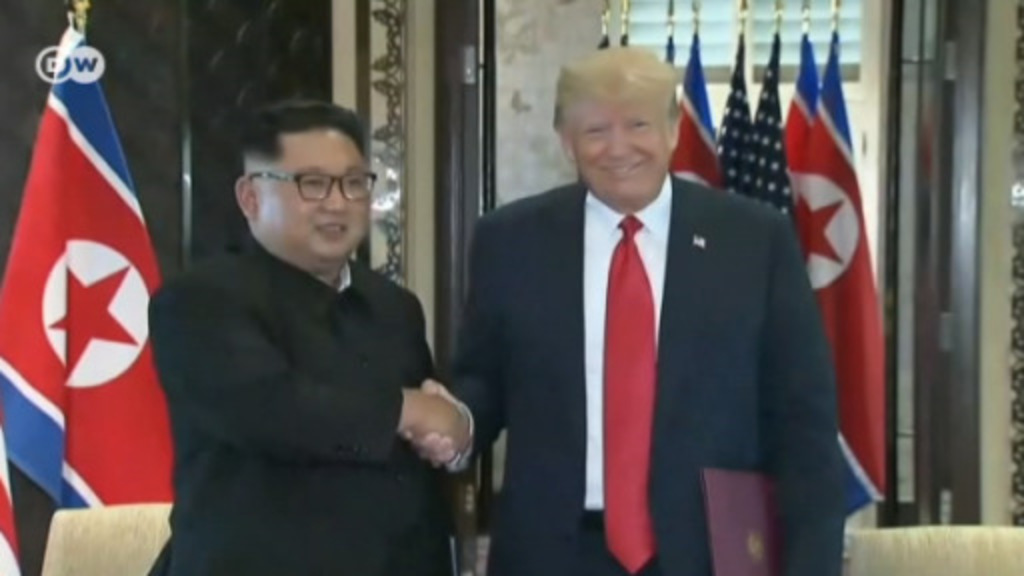News
Greece and Macedonia strike deal on name dispute
Officials from Greece and Macedonia have reached an agreement in their long-running dispute over the name of the former Yugoslav republic. By changing its name, Macedonia hopes to win membership to the EU and NATO.
Greece and the Former Yugoslav Republic of Macedonia (FRYOM) on Tuesday announced an historic agreement to resolve a decades-long name dispute that has hampered relations between the two countries and left Macedonia with its rather unwieldy formal name.
Ministers from the both countries agreed on "Republic of Northern Macedonia" as the Balkan country's new official name.
Greece's Alexis Tsipras and Macedonia's Zoran Zaev announced the agreement shortly after speaking by phone.
Read more: Macedonian PM says name change to be put to a public vote
Tsipras went on to tell Greek President Prokopis Pavlopoulos during a televised meeting: "I'm happy because we have a good deal which covers all the preconditions set by the Greek side."
The deal states that Macedonia will amend its constitution to reflect its new name. Meanwhile, Greece has reportedly agreed to stop blocking Macedonian requests to join the European Union and NATO military alliance.
What's in a name?
The dispute over Macedonia's name has been an issue ever since the country broke away from the former Yugoslavia in 1991. It declared its independence under the name Republic of Macedonia.
However, Greece, whose northern region is also called Macedonia and borders the Balkan country, objected to the name and demanded it be changed.
Both sides have laid claim to the name. Ancient Macedonia was the cradle of Alexander the Great's empire — he was known in his time as Alexander III of Macedon. Under the Romans, however, the province of Macedonia was expanded to include territory in modern-day Greece, Macedonia, Bulgaria and Albania.
The longstanding row has hindered Macedonian hopes of joining the EU or NATO.
Read more: Macedonia: What's in a name?
Still a way to go before it's official
After initial signs of a possible breakthrough earlier this year, Greece and Macedonia had been racing to agree on a settlement ahead of the upcoming EU leaders' summit in late June and a NATO summit slated for mid-July.
Senior officials from both the EU and NATO were quick to welcome the agreement. NATO Secretary General Jens Stoltenberg said he hoped the deal "would consolidate peace and stability across the wider Western Balkans."
Meanwhile, the EU's foreign policy chief Federica Mogherini said the bloc's ambitions in the Western Balkans was "a crucial incentive for this agreement, in the spirit of good neighborly cooperation."
However, the deal probably comes too late for it to have any traction at the two upcoming meetings.
The accord still needs to clear a referendum in Macedonia and win the support from a majority of lawmakers in both countries. That could still take several months, at best, nor is there any guarantee that it will come to pass at all.
The name dispute has prompted several protests in Athens, Thessaloniki and Skopje. Thousands of patriots and nationalists from both sides have voiced their anger over any prospective concessions from their government.
dm/msh (AP, AFP, dpa, Reuters)
DW recommends
Audios and videos on the topic
- Date 12.06.2018
- Related Subjects Greece, Macedonia
- Keywords Macedonia, Greece, Alexis Tsipras, Zoran Zaev
- Feedback: Send us your feedback.
- Print Print this page
- Permalink http://p.dw.com/p/2zPGA
- Date 12.06.2018
- Related Subjects Greece, Macedonia
- Keywords Macedonia, Greece, Alexis Tsipras, Zoran Zaev
- Send us your feedback.
- Print Print this page
- Permalink http://p.dw.com/p/2zPGA



















